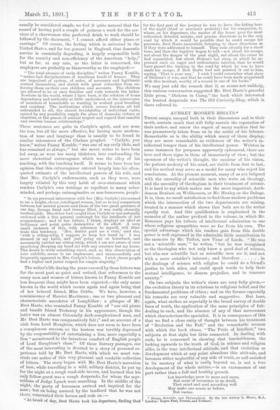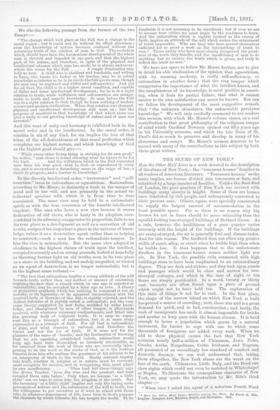AUBREY MOORE'S ESSAYS.*
THESE essays, unequal both in their dimensions and in their merit, contain much that will fully sustain the reputation of their author, and renew the regret of many readers that he was prematurely taken from us in the midst of his labours. Remarkable as is the ability which many of them display, they are more remarkable as evidences of the writer's in- tellectual temper than of his intellectual power. Written its
some instances for purposes apparently ephemeral, there are here and there signs in them of immaturity of view ; but the openness of the writer's thought, the candour of his vision, the patient modesty of his mind, are visible from first to last, and his method may serve as a model for many who reject his conclusions. At the present moment, many of us are fatigued with the unreality of scientific men who write on theology, and the unreality of theologians in their treatment of science. It is hard to say which makes one the more impatient, Arch- deacon Denison on Wellhausen, or Mr. Huxley on the Deluge. It is, then, no small satisfaction to find those modern problems which the intersection of the two departments are raising, treated in a manner which shows that both are to the writer equally real. And this qualification is emphasised in the memoirs of the author prefixed to the volume, in which Mr.
Romance pays his tribute of intellectual admiration to one whose religious sympathies were so far from his own. The special advantage which his readers gain from this double power is well expressed in the admirable little contribution to the memoirs by Mr. Talbot, now Vicar of Leeds. "He was not a scientific man,'" he writes, "but he was recognised as the theologian who not only knew a good deal of science, but who saw scientific fact as scientific men see it, and not with a mere outsider's interest ; and therefore in the dealings of science with religion he could do a friend's justice to both sides, and could speak words to help their mutual intelligence, to disarm prejudice, and to reassure anxiety."
On two subjects the writer's views are very fully given,— the evolution theory in its relations to religious belief, and the fundamental problems of ethics; and on the former especially his remarks are very valuable and suggestive. But here, again, what strikes us especially is the broad survey of double lines of truth, the application of the same principles of fair- dealing to each, and the absence of any of that narrowness which characterises the specialist. It is in consequence of this that we find a close unity of thought between his treatment of "Evolution and the Fall," and the remarkable sermon with which the book closes, "The Pride of Intellect," two
subjects at first sight but little connected. In dealing with each, he is concerned in showing that teachableness, the
looking upwards to the truth of God, in science and religion alike, is the true intellectual attitude, and that evolution or development which at any point abandons this attitude, and becomes either neglectful of any side of truth, or self-satisfied in its mastery of what is really beyond us, is not a true development of the whole nature,—is an excrescence of one
part rather than a full and healthy growth. Let knowledge grow to more and more, But more of reverence in us dwell,
That mind and soul according well May make one musk as before,
But vaster.
* Essays, Scientific and Philosophical. By the late Aubrey L. Moore, M.A. London s Kogan Paul, Trench, and TrUbnor.
We cite the following passage from the former of the two Essays :—
4' The change which took place at the Fall was a change in the moral region ; but it could not be without its effect elsewhere ; even the knowledge of nature becomes confused without the governing truth of the relation of man to God. The evolution which should have been the harmonious development of the whole man is checked and impeded in one part, and that the highest part, of his nature, and therefore, in spite, of the physical and intellectual advance which man has made, he is always and every-
where the worse for the Fall A simple illustration may help us here. A child who is obedient and teachable, and willing to learn, who trusts his father or his teacher, may be in actual knowledge as inferior as he is in size to the full-grown man, though the man may be wayward and wilful and self-assertive. And yet for all that, the child is in a higher moral condition, and capable of faller and truer intellectual development ; for he is in a right relation to truth, while wilfulness and self-assertion are antago- nistic to truth and impede knowledge. So man before the Fall was in a right relation to God, though he knew nothing of modern science and modern civilisation. When that relation was changed, physical and intellectual development still went on ; but the progress of mankind in that knowledge of God which alone can give a unity to our growing knowledge of nature and of man was arrested."
And this want of unity and harmony is exhibited both in the moral order and in the intellectual. In the moral order, it 'consists in sin of any kind, for sin implies the loss of that sense of the all-desirableness of that moral perfection which completes our highest nature, and which knowledge of God as the highest good should give :—
" While every other living thing is striving for its own good," he writes, "man alone is found choosing what he knows to be for his hurt And the wilfulness which in the Fall separated man from his true good—that is, God—is reproduced in every sin, and is everywhere a disturbing cause in the reign of law, a check to progress, and a barrier to knowledge."
In the directly intellectual order, " irreverence " and " self- assertion " issue in rationalism or agnosticism. Rationalism, according to Mr. Moore, is distinctly a fault in the temper of mind and in the will, and not primarily in the actual in- 4ellectual opinions with which it is from time to time associated. The same view may be held in a rationalistic spirit, or with the true reverence of the humble intellectual inquirer. The man who loves a new view because it seems
destructive of old views, who is hasty in its adoption, over.
'confident in its advocacy, exaggerates its proportion, fails to see its true place as a development as well as a correction of old truths, assigns it too important a place in the universe of know- ledge, values it as a destructive agent rather than as helping to construot,—such a man has the rationalistic temper. In him the view is rationalistic. But the same view adopted in ,obedience to the highest claims of truth upon the intellect, accepted reverently and on strong grounds, looked at hopefully as throwing further light on old truths, seen in its true place as a stone in the building, and not unduly magnified, or viewed as an agent of destruction, is no longer rationalistic, but is in the highest sense rational :— " The fact that rationalism implies a wrong attitude of the will towards truth rather than any method or manner of reasoning, explains the fact that a theory which in one age is rejected as rationalistic, may be accepted by a later ago as true. A theory or premature synthesis which has nothing to commend it but its novelty, or its ingenuity, or its apparent inconsistency with the received body of dootrine of the day, is rightly rejected, and the defiant defender of it rightly called a rationalist ; yet the very saw theory, supported by now facts, modified by wider know- ledge, and championed by men of other temper, is afterwards received, with whatever necessary readjustments, and fitted into the growing body of religious truth. It is easy to repre- sent this as a triumph of rationalism, but it is more truly represented as a triumph of faith. For all that is rationalistic is gone, and what remains is rational, and therefore the friend and not the foe of faith. If it were not for the glamour of the name of heretic,' and the fascination of knowing that we are upsetting established beliefs, rationalism ,would long ago have been discredited as intensely unscientific, as far removed from the work of those who are reverently inter- preting to us the word or the works of God, as is the reckless theorist from him who realises the greatness of his mission to be an interpreter of truth to the world. Really rational inquiry into truth, whether in religion or in nature, must be reverent, must recognise its mission, and in recognising this, must admit its own insufficiency 'Thou hest hid these things,' says the divine Teacher, from the wise and the prudent, and hest revealed them unto babes.' Only when we become as a little child' can we hope to enter into the kingdom of the truth. But the becoming as a little child' implies not only the laying aside preconceived notions and the submission of the will to truth, but the willingness to put ourselves as it were to school with those who, in whatever department of life, have been in God's purpose the channels by which hitherto He has taught the world. To be teachable it is not necessary to be uncritical; but if ever we are to become true critics, we must begin by the readiness to learn. And the rationalism which is rightly treated as the enemy of faith, implies an attitude of the will which makes the attainment of truth impossible. Who are they who have proved themselves sufficient for so great a work as the interpreting of truth to man P Those surely who have most clearly recognised the great- ness of the truth they handle, and the insufficiency of man to do anything but to receive the truth which is given, and truly to reflect the truth he sees."
We have not space to follow Mr. Moore further, nor to give in detail his able vindication of the opinion that agnosticism, with its seeming modesty, is really self-sufficiency, or rationalism in another form ; that the very temper which exaggerates the importance of what the intellect knows, and the completeness of its knowledge, is most positive in assert- ing, when it feels its partial failure, that what it cannot master to its own satisfaction can never be known. Nor can we follow his development of the most suggestive remark that "the unknown stimulates, the unknowable paralyses knowledge." We will only cordially commend to our readers this sermon, with which Mr. Moore's volume closes, as a real contribution to that great philosophy of the religious temper of mind which Cardinal Newman opened out fifty years ago in his University sermons, and which the late Dean of St.
Paul's did so much to preserve and develop in many of his discourses and essays. Mr. Moore's sermon deserves to be named with many of the contributions to this subject by both these great writers.



































 Previous page
Previous page